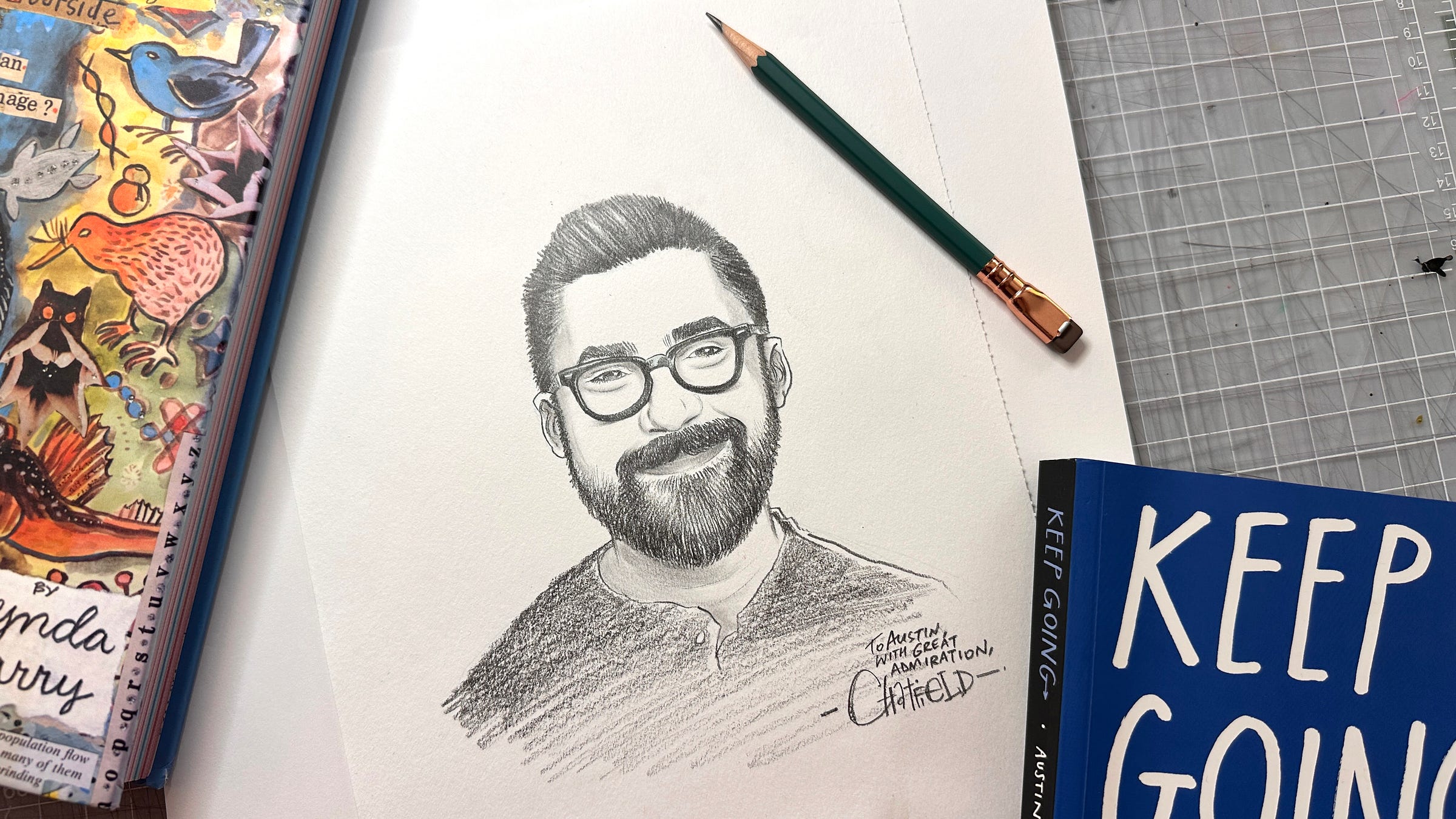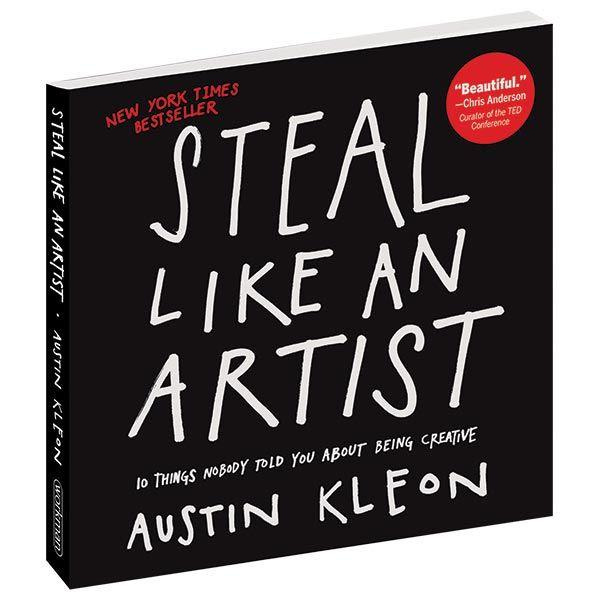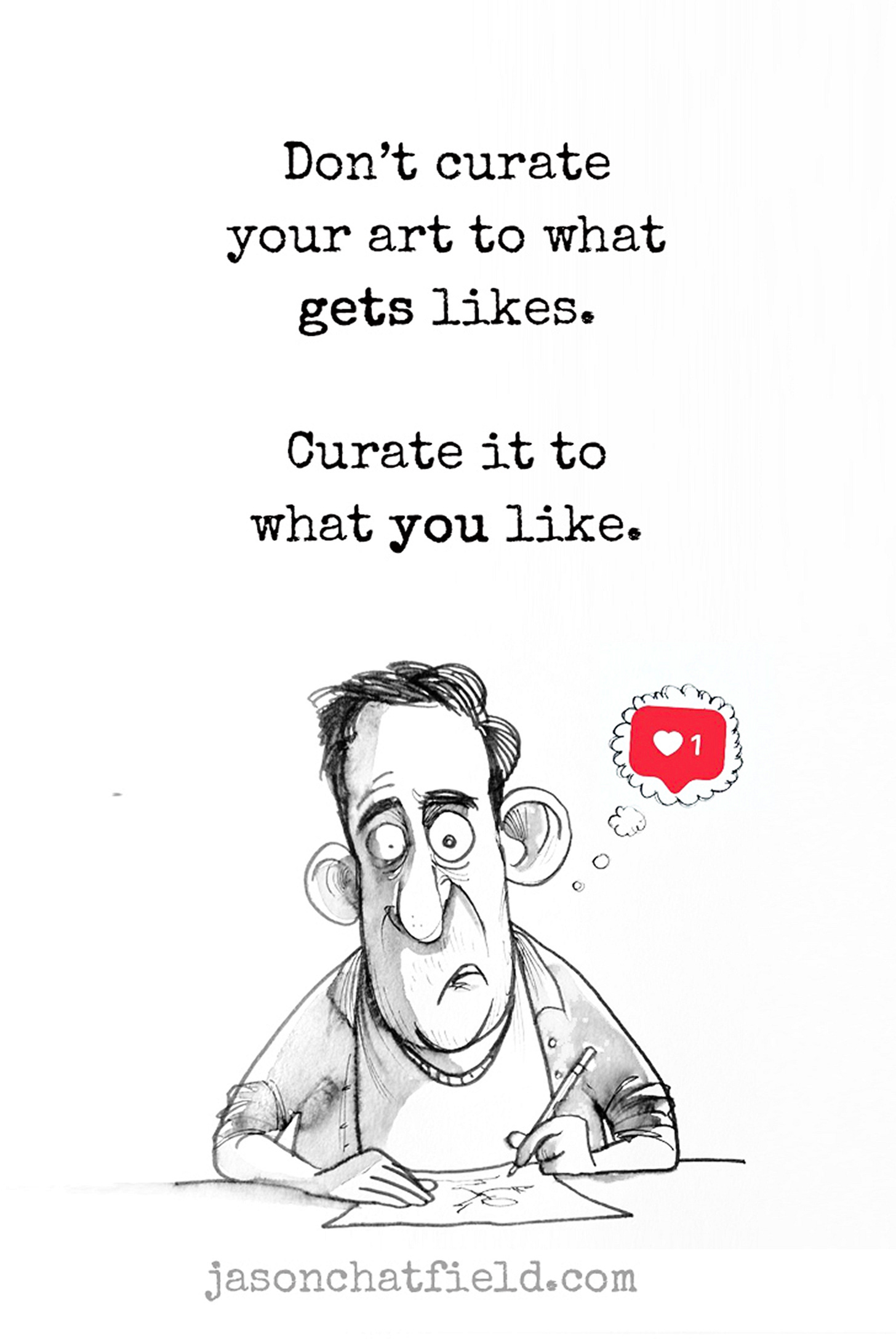Thank you The Bob, Brendan Leonard, Tammy Evans, Bill Cusano, Mariana Marques, and the 500 others who tuned into my live video with Austin Kleon yesterday!
Join me for the next one on Friday at 11am EDT — I’ll be talking & drawing with special guest, Two-Time Pulitzer Prize-winning Cartoonist, Ann Telnaes!
About The Guest:
Austin is the New York Times bestselling author of a trilogy of illustrated books about creativity in the digital age: Steal Like An Artist, Show Your Work!, and Keep Going.
His books have sold nearly two million copies. Two million. That's even more than the 27 of mine that sold this month! They've been translated into over 30 languages (including Australian.) New York Magazine called his work "brilliant." The Atlantic called him "one of the most interesting people on the Internet," and The New Yorker said his poems "resurrect the newspaper when everybody else is declaring it dead."
He also does talks for organizations such as Pixar, Google, Netflix, SXSW, TEDx, Dropbox, Adobe, and The Economist. This is the kind of client list that makes freelancers weep into their instant noodles.
With that intro out of the way, here is the recap of our conversation. At the bottom, I’ve also included a full list of books recommended or discussed during our one-hour talk.
Comedy Over Tragedy: What Austin Kleon Taught Me About Creative Survival
Yesterday, I had the pleasure of chatting with the brilliant mind behind Steal Like an Artist, Show Your Work, and my personal favorite, Keep Going. What started as a conversation about creative routines turned into a masterclass on attention management, the importance of play, and why treating your art like a comedy might be the secret to actually surviving as a creative person.
The Magic of Knowing What You Like
Austin started by dropping one of those deceptively simple truths: "Knowing what you like is this kind of magic tonic for your attention." It sounds almost embarrassingly basic, but as he pointed out, "we live in this world where everyone else is trying to tell you what to like constantly."
The problem? If you don't know what you actually like, "how are you going to know what you're supposed to make? Because really, what we make is more stuff like we like. We take all the things that we like and we put them together and that's our work."
This hit me hard because in previous years, I've been guilty of the exact opposite: creating things that get likes rather than things I actually like.
Austin's approach is refreshingly honest: "Only I actually know what I like, right? And so my reading life, for example, is so much richer when I just focus on what I really, really like to read."
The Brian Eno Prescription for Focus
Austin's been studying Brian Eno for over a decade, and shared Eno's current obsession with attention management. The key insight: When you truly know what you like, “you can tune in to what you're supposed to be paying attention to. It gives you focus."
This connects to something profound he observed about kids: "Kids know what they like, especially know what they don't like." They're naturally discerning in a way we somehow unlearn as adults. As Austin put it, his kids were "almost like an executive... they were very, I like that. I don’t like that—and I loved it." (He has a book coming out soon called “Don’t Call It Art” expanding on the value of this insight.
The Artist's Survival Guide
Here's where things got real. Austin shared a quote from art coach Beth Pickens that completely reframed my thinking about creative work: "Artists are people for whom their life is less when they don't work." Not that they can't do anything else, but that "my life suffers when I'm not making stuff."
The guilt around "selfish" creative time dissolves when you realize you're not just indulging yourself – you're showing up to your work, so that you can feel more alive inside, so that then you can show up for other people.
The Tragedy vs. Comedy Framework That Changes Everything
This might have been the most brilliant part of our conversation. Austin breaks down how most people think about art through the lens of tragedy: "a very special person with a gift who struggles and fights against the world... and then you know, it takes a great toll on them. So they have to shoot up heroin or whatever. And then when they get success, they get rich and they drink themselves to death."
But there's another way —the comedy approach. In comedy, you have "an ordinary person, just a regular person, maybe even a lowly person... And what they do is they bumble, they fumble, they improvise... but their fatal flaw, they don't really have a fatal flaw. What they have is their wits."
The beautiful thing about a comedy? "There is no success in a comedy. There's just failure after failure, basically. But what happens at the end of a comedy is... celebration, a wedding... People coming together at the end."
Austin's thesis: "To take a comedic approach to art and creativity is to accept yourself as an ordinary person that gets into trouble, gets in over their heads, but relies on improvisation and their wit... and play."
The Survival Mechanism of Humor
This isn't just feel-good philosophy – it's a practical survival strategy. Austin referenced Survive the Savage Sea, about a family adrift at sea for 40 days. When asked what helped them survive, the father said, "a well-developed sense of the absurd."
As Austin put it: "Comedy is not just for fun, happy times. Comedy is a survival mechanism." Mel Brooks echoes this: "If you have a sense of humor, you can get through things."
The Mathematics of Showing Up
When we talked about routine and consistency, Austin brought it down to simple math: "One day doesn't feel like much, but... if you can do one page a day, at the end of one year, you have 365 pages. That's enough for a book."
But here's the kicker —it's not just cumulative, it's exponential. Using a prickly pear cactus as an example, Austin showed how creative work compounds: "Every day isn't worth the same. If you show up every day for 365 days, the 366th day is actually going to have more power than the first day."
The Time Timer Revolution
One of the most practical tools Austin shared was his beloved timer. The paradox of creative time management: "If you want to disappear, set a timer... if you want to make time disappear, you need to work with time."
Here’s the one I have on my desk:
His process is beautifully simple: "You block off an hour tomorrow. You block it off on your calendar where no one can get to you... Then you sit down at your desk, and you set a timer for 60 minutes. Then you see what happens."
The Hobby Resistance Theory
In a fascinating tangent, Austin shared George Orwell's theory that the British "penchant for hobbies helped them resist fascism" because "people with hobbies were able to resist fascism more because they were able to spend time alone... they didn't need some sort of demagogue to tell them what to do."
His conclusion? "I think something that's happening in American culture is nobody has any hobbies anymore. And so they're just looking around for someone to tell them what to do." The solution might be as simple as more people getting into woodworking.
Finding Your Creative Comedy
What struck me most about his approach is how it removes the pressure to be a tortured genius and gives you permission to just be a regular person who makes stuff. As he said, "I think almost 99% of people shouldn't try to make their creative work their job. I think almost 100% of people should have some sort of creative practice."
The goal isn't to become the next tragic artist hero; it's to show up, play, bumble through, and maybe bring people together in the process. As he beautifully put it: "The arts have traditionally been a place for people that weren't super great at life... because they struggle with life, they give us this great art."
So maybe the secret isn't learning to suffer for your art – maybe it's learning to laugh with it instead.
I’m grateful to Austin for his time and insights— this was one of the best conversations I’ve had, and I’m lucky I got to have it.
Recommended Reading
Books mentioned in our conversation:
Steal Like an Artist by Austin Kleon - The creativity classic that started it all
Show Your Work by Austin Kleon - How to share your creativity and get discovered
Keep Going by Austin Kleon - 10 ways to stay creative in good times and bad
Newspaper Blackout by Austin Kleon - Austin's first book of found poetry
What It Is by Lynda Barry - One of the best books on creativity ever written
Making Comics by Lynda Barry - Essential reading for visual storytellers
Daily Rituals by Mason Currey - How great creators structure their days
Daily Rituals: Women at Work by Mason Currey - The essential sequel focusing on women creators
Survive the Savage Sea by Dougal Robertson - A survival story with lessons for creative resilience
The Comedy of Survival by Joseph Meeker - An alternative framework for thinking about creative work





















